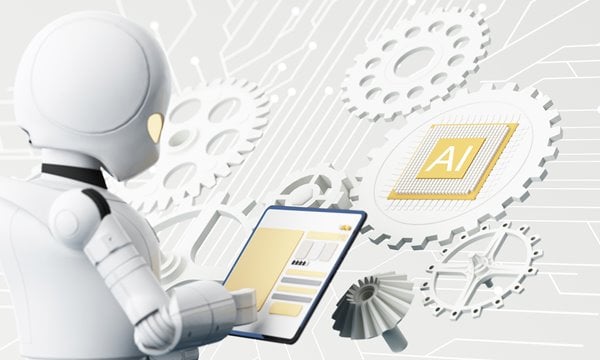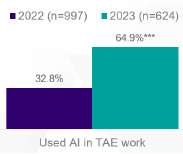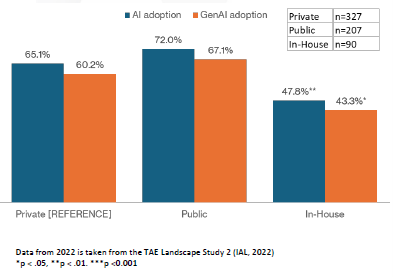
Event
AI, The TAE Game Changer
AI, The TAE Game Changer
Description
Much has been said about the disruption brought on by AI in terms of jobs, skills, and business models. There is, however, less realisation of the opportunities AI is already creating, especially in the field of training and adult education (TAE).
The World Economic Forum predicts that by 2027, 83 million jobs are likely to be destroyed while 69 million new jobs will be created. Technological adoption and automation are the main driving forces behind the shift in job market composition. Many of the new jobs will be technology-related, along the lines of such roles as data analysts, digital transformation specialists, and AI and Machine Learning Specialists. As AI proliferation in the workplace accelerates, a world of new opportunities for the TAE sector opens up in tandem.
In this new normal, there are three key takeaways that training and adult education (TAE) providers and practitioners need to note: first, that adult educators (AEs) are the front-runners of AI adoption; second, that AEs need to adopt AI effectively; and third, that there are resources available to help our AEs to upskill and reskill in order to make the most of AI in their roles.
AEs are the front-runners of AI adoption
At the end of the day, human users need to prompt, wield, and execute AI tools to achieve better business outcomes. In this sea change, we must emphasise that Adult Educators (AEs) are the front-runners with a critical role—to help enterprises and their workforces to upskill and reskill for the AI-driven future.
In a 2023 survey of AI adoption across 18 countries, Boston Consulting Group found that while 86% of respondents believed they need training to prepare for the new era of AI at work, only 14% of frontline employees had undergone any relevant upskilling. This points to the critical need for the TAE sector to step up to capture the group that has yet to take action.
Training will be needed across industries in AI literacy, AI products, and AI-powered work processes. Work and job scopes will evolve with AI adoption, making it necessary for TAE providers and professionals to work with enterprises to integrate AI at the workplace. Expertise in developing AI EdTech tools and personalised AI-enhanced, data-driven learning will also grow in demand.
Given that the full potential of AI has yet to be reached, TAE professionals will need to keep abreast of advancements in technology and experiment alongside enterprises to tap on AI and machine learning for better business outcomes. The learning offerings designed by TAE professionals will also have to be workplace- and workforce-centric, with immediate practical application and benefits for enterprises. It will not be sufficient for AEs to focus just on imparting general literacy in AI alone.
There is a world of new TAE opportunities but accessing these will depend on how adept our AEs are in AI know-how.
It’s time to transform AE practice through AI
AI is already revolutionising every aspect of training. Learning management systems such as Moodle and D2L have integrated AI in their platforms, allowing for much faster, smarter ways to develop engaging course content and design assessments. Adaptive learning technologies, for example those offered by Adaptemy and Knewton, enable content to be highly personalised and adapted to individual learners’ needs. The embedded AI technology identifies learning gaps immediately and delivers the required learning, effectively offering a “pedagogy of one”.
These tools are readily available for AEs to tap on and transform their practice, making learning far more personalised and effective for enterprise customers. Yet adoption of such EdTech tools remains low in Singapore.
In IAL’s “Artificial Intelligence in Training and Adult Education Survey 2023”, we found it encouraging that AEs in Singapore are increasingly adopting AI. The use of AI among adult educators for their work has doubled between 2022 and 2023, from 32.8 percent to 64.9. Those who use AI reported workload reduction, enhanced productivity, and higher work satisfaction. Among the AI users, most found AI to be essential in courseware development (76.8 percent), curriculum design (74.7%), and learning needs analysis (66.7%).
While these results are heartening, further investigation shows that more needs to be done for AEs to maximise the transformative potential of AI. The majority of AEs surveyed reported that they mainly use generic tools like ChatGPT, Bard, and BingAI rather than specialised tools such as Knewton, which better enable AEs to create value with AI, rather than just use AI as substitution means to take on current work. The level of AI literacy varies dramatically as well—with some AEs listing email and AR tools as AI technologies they use, pointing to how in-depth understanding of AI’s reach and potential is still lacking.


Adopt AI to use AI
AI tools, especially GenAI, have tremendous potential to transform adult training and education. But tapping on these tools effectively requires AI literacy and skills.
IAL’s survey shows that there is high awareness of how AI can support TAE work, with 80 percent of respondents acknowledging that they need training and professional development in AI. Nonetheless, only about 3 in 10 have gone for intermediate or advanced training, with about 70 percent of AE respondents having attended basic training or none at all.
As the National Centre of Excellence for Adult Learning, IAL is committed to supporting TAE providers and professionals in their AI journey. One way to address the TAE professionals’ learning gaps and ensure that AI scaffolds and complements training is through AEs accessing Continuing Professional Development (CPD) courses. The courses are carefully curated to meet the varied needs of learners, from using AI to enhance assessment and learning design, to facilitation and problem-based learning. For example, "Jumpstart Your Learning Design with Generative AI! - A Hands-On Essentials Workshop" for beginners not only acquaints participants with the latest advancements in generative AI but also highlights best practices for integrating AI into the various aspects of the training process, from needs analysis to the development of learning activities and assessments.
The "Supercharge Your Learning Design with Generative AI!" workshop guides participants in exploring the latest techniques and strategies for using generative AI to create effective and engaging multimedia learning resources, including infographics, audio, video, and animation. Participants will learn to design storyboards, develop branching scenarios, and evaluate and refine generated content to align with instructional design principles and learning objectives.
As of August 2024, these two courses alone have seen the enrolment of over 500 learners. IAL will be launching a suite of courses that reimagines pedagogical approaches, such as AI-augmented Problem-based and Case-based Learning.
AI Singapore is another resource that AEs can tap on, with its set of courses to help level up the AI literacy of working professionals. These courses, while not specific to the TAE sector, provide a baseline understanding of AI, common tools, and the capabilities of these tools.
For TAE providers, adopting AI strategically will be crucial to their competitiveness, especially in the increasingly digitised, borderless world of training. Training providers looking to strengthen their adoption of AI may tap on the AI Readiness Index to assess their readiness and identify the gaps between their current and desired states.
Training and adult education has been transforming rapidly in the last few years. Whether TAE providers and practitioners can ride out the disruption and successfully exploit the new vistas presented by AI will depend on their ability to effectively leverage new technologies and transform their practice.
The World Economic Forum predicts that by 2027, 83 million jobs are likely to be destroyed while 69 million new jobs will be created. Technological adoption and automation are the main driving forces behind the shift in job market composition. Many of the new jobs will be technology-related, along the lines of such roles as data analysts, digital transformation specialists, and AI and Machine Learning Specialists. As AI proliferation in the workplace accelerates, a world of new opportunities for the TAE sector opens up in tandem.
In this new normal, there are three key takeaways that training and adult education (TAE) providers and practitioners need to note: first, that adult educators (AEs) are the front-runners of AI adoption; second, that AEs need to adopt AI effectively; and third, that there are resources available to help our AEs to upskill and reskill in order to make the most of AI in their roles.
AEs are the front-runners of AI adoption
At the end of the day, human users need to prompt, wield, and execute AI tools to achieve better business outcomes. In this sea change, we must emphasise that Adult Educators (AEs) are the front-runners with a critical role—to help enterprises and their workforces to upskill and reskill for the AI-driven future.
In a 2023 survey of AI adoption across 18 countries, Boston Consulting Group found that while 86% of respondents believed they need training to prepare for the new era of AI at work, only 14% of frontline employees had undergone any relevant upskilling. This points to the critical need for the TAE sector to step up to capture the group that has yet to take action.
Training will be needed across industries in AI literacy, AI products, and AI-powered work processes. Work and job scopes will evolve with AI adoption, making it necessary for TAE providers and professionals to work with enterprises to integrate AI at the workplace. Expertise in developing AI EdTech tools and personalised AI-enhanced, data-driven learning will also grow in demand.
Given that the full potential of AI has yet to be reached, TAE professionals will need to keep abreast of advancements in technology and experiment alongside enterprises to tap on AI and machine learning for better business outcomes. The learning offerings designed by TAE professionals will also have to be workplace- and workforce-centric, with immediate practical application and benefits for enterprises. It will not be sufficient for AEs to focus just on imparting general literacy in AI alone.
There is a world of new TAE opportunities but accessing these will depend on how adept our AEs are in AI know-how.
It’s time to transform AE practice through AI
AI is already revolutionising every aspect of training. Learning management systems such as Moodle and D2L have integrated AI in their platforms, allowing for much faster, smarter ways to develop engaging course content and design assessments. Adaptive learning technologies, for example those offered by Adaptemy and Knewton, enable content to be highly personalised and adapted to individual learners’ needs. The embedded AI technology identifies learning gaps immediately and delivers the required learning, effectively offering a “pedagogy of one”.
These tools are readily available for AEs to tap on and transform their practice, making learning far more personalised and effective for enterprise customers. Yet adoption of such EdTech tools remains low in Singapore.
In IAL’s “Artificial Intelligence in Training and Adult Education Survey 2023”, we found it encouraging that AEs in Singapore are increasingly adopting AI. The use of AI among adult educators for their work has doubled between 2022 and 2023, from 32.8 percent to 64.9. Those who use AI reported workload reduction, enhanced productivity, and higher work satisfaction. Among the AI users, most found AI to be essential in courseware development (76.8 percent), curriculum design (74.7%), and learning needs analysis (66.7%).
While these results are heartening, further investigation shows that more needs to be done for AEs to maximise the transformative potential of AI. The majority of AEs surveyed reported that they mainly use generic tools like ChatGPT, Bard, and BingAI rather than specialised tools such as Knewton, which better enable AEs to create value with AI, rather than just use AI as substitution means to take on current work. The level of AI literacy varies dramatically as well—with some AEs listing email and AR tools as AI technologies they use, pointing to how in-depth understanding of AI’s reach and potential is still lacking.


Adopt AI to use AI
AI tools, especially GenAI, have tremendous potential to transform adult training and education. But tapping on these tools effectively requires AI literacy and skills.
IAL’s survey shows that there is high awareness of how AI can support TAE work, with 80 percent of respondents acknowledging that they need training and professional development in AI. Nonetheless, only about 3 in 10 have gone for intermediate or advanced training, with about 70 percent of AE respondents having attended basic training or none at all.
As the National Centre of Excellence for Adult Learning, IAL is committed to supporting TAE providers and professionals in their AI journey. One way to address the TAE professionals’ learning gaps and ensure that AI scaffolds and complements training is through AEs accessing Continuing Professional Development (CPD) courses. The courses are carefully curated to meet the varied needs of learners, from using AI to enhance assessment and learning design, to facilitation and problem-based learning. For example, "Jumpstart Your Learning Design with Generative AI! - A Hands-On Essentials Workshop" for beginners not only acquaints participants with the latest advancements in generative AI but also highlights best practices for integrating AI into the various aspects of the training process, from needs analysis to the development of learning activities and assessments.
The "Supercharge Your Learning Design with Generative AI!" workshop guides participants in exploring the latest techniques and strategies for using generative AI to create effective and engaging multimedia learning resources, including infographics, audio, video, and animation. Participants will learn to design storyboards, develop branching scenarios, and evaluate and refine generated content to align with instructional design principles and learning objectives.
As of August 2024, these two courses alone have seen the enrolment of over 500 learners. IAL will be launching a suite of courses that reimagines pedagogical approaches, such as AI-augmented Problem-based and Case-based Learning.
AI Singapore is another resource that AEs can tap on, with its set of courses to help level up the AI literacy of working professionals. These courses, while not specific to the TAE sector, provide a baseline understanding of AI, common tools, and the capabilities of these tools.
For TAE providers, adopting AI strategically will be crucial to their competitiveness, especially in the increasingly digitised, borderless world of training. Training providers looking to strengthen their adoption of AI may tap on the AI Readiness Index to assess their readiness and identify the gaps between their current and desired states.
Training and adult education has been transforming rapidly in the last few years. Whether TAE providers and practitioners can ride out the disruption and successfully exploit the new vistas presented by AI will depend on their ability to effectively leverage new technologies and transform their practice.
